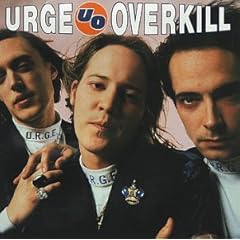
This was hip once.
I took the thirty or so cassettes I still own back to State College over Christmas - the only cassette player I still have access to is the one in my mom's car (My VHS collection will head home before I move to NY as well; it's all about friends, family and outdated media whenever I visit). The first tape I put on was Urge Overkill's The Supersonic Storybook, beating out such worthy contenders as Teenage Fanclub's Bandwagonesque, Girls Against Boys' House Of GVSB, Sugar's Besides and mixtapes with names like Listenable Out Of Unlistenable No. 3, Gimme Indie Schlock! and Shake Some Jangle.
A new CD of The Supersonic Storybook costs less than $10 on Amazon, and I'll buy it eventually. Christgau gives the album a C in the consumer guide, accusing the flashy dandies of "mix-and-match hipster one-upsmanship." That quality isn't as easy to hear as the "sludgy hooks, whiner groans, and arrogant exoticism" today, and that arrogance that has been rendered merely ridiculous by the ravages of time and a lack of success outside of a Neil Diamond cover (which means no songwriting royalties of note for King Roeser, Nash Kato and Blackie Onassis).
Examples of said one-upsmanship and exoticism: reading off the big cities in which "The Kids Are Insane," promoting a "Bionic Revolution," covering Hot Chocolate's melodramatic suicide ode "Emma," and writing their own six minute tale of Native American love and warfare, "Henhough: The Greatest Story Ever Told," immediately followed by the instrumental "Theme From Navajo." My favorite track is "Vacation In Tokyo," which mourns a love who's left Nash and/or King "feelin' the breeze," begging God to "give me back my fantasy." Finally, he asks that girl remember him in his robe on their vacation in Tokyo, as the song climaxes with a repeated run through the opening notes of the Vapors' "Turning Japanese." I shit you not.
In the 90s update of Stairway To Hell, Chuck Eddy, praising them for "making fun of '70s AOR riff-fully and tunefully enough to pass for both satire and the item itself," also observes that these guys could be "Replacements-flimsy," with wimpy vocals that don't quite fit the hey-baby fashion sense. It's that odd presence of a heart on their leisure suit sleeve that endears me to the band. Their last album (though a reunion is afoot), 1995's Exit The Dragon, is a beautiful drag full of heartbreak and angst, peaking with their then-junkie drummer's overdose ballad "The Mistake," which conveys plenty of tragic pathos despite opening with "Travellin' 'cross the USA, it's hard sometimes to keep it together. Nothing but the songs that you play, and a couple kids believin' your sound." It's as if critics misjudged these guys, assuming they were too-cool-for-school jack-offs when rawk cliches and artifice were their only means of expression. Their legacy may be the sole property of clearance CD bins, like so many of their Geffen Records peers, but the final product is more dynamic and affecting than most of the fuzz the era provided.
No comments:
Post a Comment